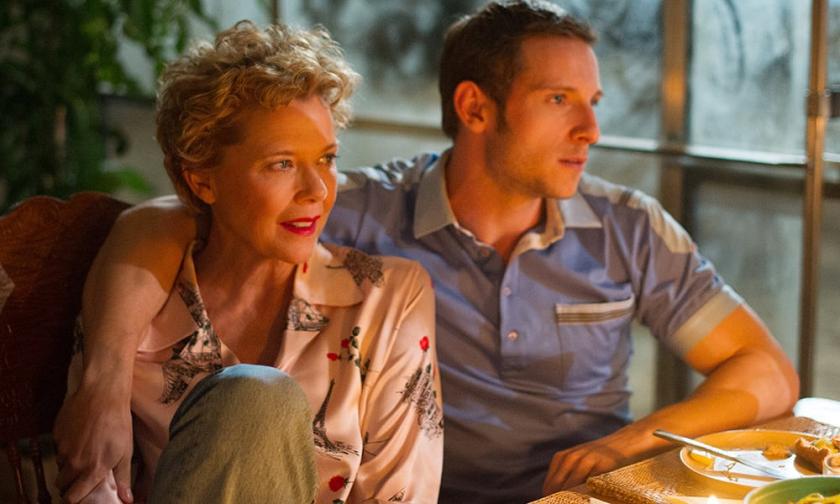Screen biographies are tricky things to pull off when the person portrayed has left behind an indelible screen presence. It was hard to love Michelle Williams dragging up for My Week with Marilyn; Grace of Monaco was far from Nicole Kidman’s finest hour. But Annette Bening is wholly mesmerising as Gloria Grahame, Oscar-winning femme fatale turned jobbing actress in late '70s England.
Film Stars Don't Die in Liverpool is based on actor Peter Turner’s slim, self-deprecating memoir of his love affair with Grahame, first published in 1986 some five years after her death. Turner met the film noir legend when they both rented rooms in a London boarding house in 1979. Despite being at least a generation older than him, they fell in love and their romance lasted two years, stretching from New York to LA before ending in Liverpool in his parents’ house.
Jamie Bell is charming as the young Turner, a compliant beau with a kind heart, wide shoulders and neat footwork. They meet cute when he channels Tony Manero to help Grahame practice the hustle. It’s fun to see that Billy Elliot still has the moves but it is Bening’s shimmy that breaks your heart. This is her movie and it's aimed at the Academy. She captures Grahame’s breathy voice and sharp wit perfectly; her pleasure in her young lover is clear, as is her wistfulness for the classical stage career she never had. Bening doesn't dodge the lens which highlights her own ageing face and gives a superbly brave performance. I found myself scurrying back to The Grifters, the neo-noir she made in her 20s, where she plays exactly the kind of playful femme fatale that Grahame made her own throughout the 1950s.
Director Paul McGuigan, collaborating with the gifted cinematographer Ula Pontikos, pulls off some real cinema magic, using back projection and fluid camera moves to convey the lovers' golden time in America (the whole film was shot in the UK). But it falls down in the art department. The interior scenes are suffocating with their near-obsessive period detail – patterned wallpaper, nightmarish carpeting and painfully bad wigs for Julie Walters as Peter’s warm-hearted mum and Stephen Graham as his grumpy brother.
Too many scenes in the kitchen in Liverpool threaten to sink the film into kitchen sink realism. While I was grateful that there weren’t chunks of clunky exposition shoe-horning Grahame’s scandalous marital history into the script, I missed some of the character insight from Turner’s original memoir. But if it makes a new generation go in search of Gloria Grahame’s back catalogue (In a Lonely Place is her finest) and wins Bening a well deserved Oscar, it’s worth it. ★★★★
Professor Marston and The Wonder Women  Like Film Stars, this film suffers from too much attention to period detail and costume fetishism and not enough courage to eschew conventional narration for something more daring. Claiming to be a based on a true story, it’s the tale of Harvard psychology professor William Moulton Marston (Luke Evans, above centre) who together with his brilliant, spiky wife Elizabeth (Rebecca Hall, above left), designed a prototype lie detector machine in the 1930s. He lectures flirtatiously to his all-girl class on his theory that male-female relations are based on dominance and submission. Bella Heathcote plays Olive (above right), a student whose doll-like prettiness (and an aunt and mother who are pioneer feminists) intrigues him. His desire for Olive is briefly thwarted when she demonstrates that she’s more interested in snogging his wife than him, but they soon settle into a scandalous threesome and are forced to leave the university.
Like Film Stars, this film suffers from too much attention to period detail and costume fetishism and not enough courage to eschew conventional narration for something more daring. Claiming to be a based on a true story, it’s the tale of Harvard psychology professor William Moulton Marston (Luke Evans, above centre) who together with his brilliant, spiky wife Elizabeth (Rebecca Hall, above left), designed a prototype lie detector machine in the 1930s. He lectures flirtatiously to his all-girl class on his theory that male-female relations are based on dominance and submission. Bella Heathcote plays Olive (above right), a student whose doll-like prettiness (and an aunt and mother who are pioneer feminists) intrigues him. His desire for Olive is briefly thwarted when she demonstrates that she’s more interested in snogging his wife than him, but they soon settle into a scandalous threesome and are forced to leave the university.
Churning out pop psychology articles doesn’t really pay their household bills or promulgate his theory, so Moulton turns to comic book creations and launches Wonder Woman on the world with the help of DC comics. The kinky costume and barely concealed bondage and spanking themes see him hauled up in front of a decency committee while his home life (children with both women) causes local scandal.
Writer-director Angela Robinson cuts back and forth between interrogation by decency committee and the romance. She has bathed the entire film with a nostalgic glow worthy of a 1990s Armani advert. The sex scenes are so wholesome as to be almost farcical. Cutting through this schmaltz is a laser-like performance from Rebecca Hall, whose intelligence and line delivery is entertaining if anachronistic. Did women in the 1930s, no matter how smart, really say things like, "When are you going to stop justifiying the whims of your cock with science?" Or describe someone as a "Grade A bitch"? Hall makes the other two players in her ménage à trois look like Ken and Barbie dolls; her performance just about saves the film, but it's a bit of a wasted opportunity to tell what was a remarkable story. ★★















Add comment